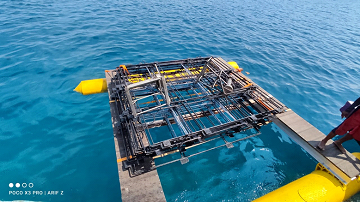
Sea Farming Center, Center for Coastal and Ocean Resources Studies (PKSPL) IPB University received a submersible cage unit from PT Gani Arta Dwitunggal (a manufacturer of marine and fishery facilities and infrastructure under the AquaTec brand). The assembly of the lobster submersible cage was attended by the Head and Secretary of PKSPL IPB University, Dr. Yonvitner and Dr. Ruddy Suwandi, (30/10).
The assembly of the submersible cage begins with the installation of 2 aluminum platforms on top of 2 float cylinders. Installation of the platform was carried out by two technicians from PT Gani Arta Dwitunggal assisted by technicians from Balai Sea Farming, students who were conducting research, and 4 fishermen who were deliberately recruited to assemble the submersible cage.
After the platform is installed, then all components are loaded onto the boat and then carried by motorized boat to the Sea Farming Center in Gosong Semak Daun, Seribu Islands.
“The submersible cage grant is part of the Kedaireka Matching Fund Program, the result of a collaboration between PKSPL, Department of Aquaculture, Faculty of Fisheries and Marine Sciences (FPIK) IPB University and PT Gani Artha Dwi Tunggal. The submersible cage will be used to support lobster development research activities,” said Dr Yonvitner.
Dr Yonvitner added that the installation of this submersible cage is a real first step to making Sea Farming a center for community-based lobster development. This is important, because lobster is a premium commodity that has high economic value if its existence can be utilized optimally.
“Therefore, through the Kedaireka Sea Lobster Matching Fund Program, the role of science and technology (science and technology) as well as IPB University’s knowledge is important here. Besides that, DUDI (Industrial World Business) is an important part of the science and technology output that will be developed later. Therefore, we invite PT Gani Arta Dwitunggal to be an important part of this collaboration,” he said.
Dr Ruddy Suwandi added, “Sea Farming as a concept has been completed. However, technological developments require the concept to be able to adapt and evolve into sea farming 4.0. The initial step of this is through the sea farming lobster program (Kedaireka matching fund program). We feel this program is very important to come up with a solution to the lobster problem. Where the support from the Department of Aquaculture IPB University and PT Gani Arta Dwitunggal is very important to produce appropriate and community-based science and technology. Besides that, this program is an important part of the implementation of the concept of Merdeka Learning at the Merdeka Campus of IPB University (MBKM),” he added.
In a separate place, Dr. Irzal Effendy as Head of the Division of Coastal and Marine Science Technopark PKSPL IPB University who is also a Lecturer in the Department of Aquaculture IPB University explained that the application of sub-mersible cages in lobster cultivation aims to obtain a culture environment that may be more suitable. . Such as temperature, light intensity, currents, sea waves, and so on.
“IPB University will test the sinking cage produced by PT Aquatec by involving students and research lecturers. The tests cover production and business performance, as well as lobster health conditions and water quality in floating net cages/KJA and so on,” he said.
According to him, in an optimal environment, the lobster’s appetite will always be high and if there is not enough food available, it can lead to cannibalism. Therefore, in the sinking cages it is necessary to do good management of feeding for lobsters.
“The marine ecosystem around the sinking cages and their interactions with the lobsters that are kept will also be studied. The performance of this submerged cage will be compared with floating cages or KJA which are commonly used for aquaculture in Indonesia,” he said.
He added that the production system that will be developed with the submerged cage application includes nurseries of clear seeds or baby lobster (pulerulus) up to 5 grams in size (nursery I) and 5 grams up to 30 grams in size (nursery II), as well as lobster rearing up to 30 grams. reach consumption.
“We hope that the national lobster cultivation system and technology can be established as quickly as possible and be able to match and even surpass Vietnam. As the main producer of aquacultured lobster, almost all of the baby lobster they use comes from Indonesia. IPB University together with PT Aquatec are actively involved in solving the nation’s problems related to lobster,” he said. (MQS/RDS/Zul)
Published Date : 03-Nov-2021
Resource Person : Dr Yonvitner
Keyword : lobster, Sea farming, PKSPL, FPIK, IPB University
SDG : SDG 4 – QUALITY EDUCATION, SDG 9 – INDUSTRY, INNOVATION AND INFRASTRUCTURE, SDG 14 LIFE BELOW WATER
































